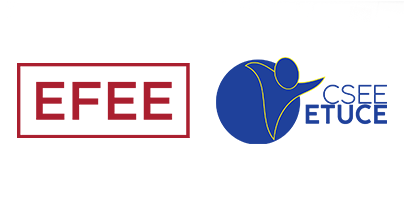ETUCE and EFEE adopt joint declarations on Val Duchesse and the upcoming European elections
Published:
On 5 March ETUCE and EFEE met for the working group of the committee of the European Sectoral Social Dialogue for Education (ESSDE) and adopted a Joint Statement on the organisation of the ESSDE and on post-Val Duchesse Summit. In this declaration, the education social partners stress the importance of the political and organisational support that the European Commission provides to sectoral social dialogue and the crucial role that social partners have in representing the specificities of the education sector.
In fact, regarding the future Pact for European Social Dialogue, which was announced at the Val Duchesse Summit on 31 January 2024, ETUCE and EFEE insist that it will have to take into consideration and recognise the role of sectoral social partners at European and national level: without the appropriate representation of the sectors, social dialogue risks losing the crucial granularity that allows social partners to adequately tackle employment and work-related issues. For this reason, ETUCE and EFEE consider it necessary that the Commission engages a large representation of European sectors during the negotiations leading to the new Pact for Social Dialogue
ETUCE and EFEE also adopted a Joint statement on the European elections 2024 calling on prospective Members of the European Parliament (MEPs) to prioritise the enhancement of education quality and equal access to education throughout Europe. ETUCE and EFEE invite future MEPs to defend the principles of social dialogue and collective bargaining, which serve as bedrock pillars of democratic participation in education policymaking. The erosion of these principles threatens the integrity of democratic governance within the education sector and must be vigorously fought.
Supporting social dialogue in education within EU Member States and candidate countries is of paramount importance as it fosters collaboration among social partners in shaping educational policies and practices. By ensuring the active participation of all parties, social dialogue promotes inclusivity, equity, and transparency in decision-making processes, ultimately enhancing the quality and relevance of education systems. Furthermore, ETUCE and EFEE insist on the effects of the ongoing reform of the EU economic governance, which puts at risk the capacity of Member States to make adequate investments in education endangering the fundamental principle of universal access to education. ETUCE and EFEE expect future MEPs to display a firm commitment to safeguarding high-quality education from the influence of profit-driven interests.
During the ESSDE meeting of today, ETUCE and EFEE representatives also exchanged with the European Commission, DG EAC, on issues related to teacher shortages, flexible pathways and acquisition of qualifications", presenting their views about national cases or examples relative to the ongoing shortage of teachers in several countries, and measures to introduce and regulate flexible pathways to the profession as well as the acquisition of qualifications. The European Commission referred to the Education and Training Monitor (ETM), which has a special focus on the teaching profession and alternative pathways into the teaching profession, and this Eurydice report addressing the topic of alternative pathways. Critical summary and assessment of the ETM 2023 by ETUCE, are available here and here.